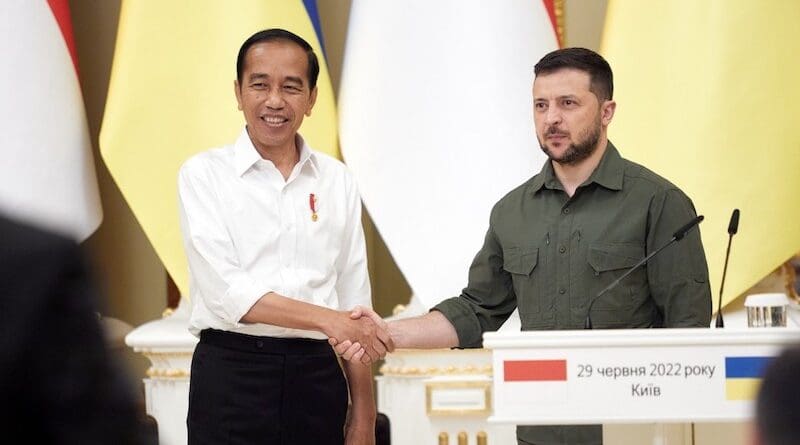Russia Claims Indonesian Mercenaries Fighting For Ukrainian Military
By BenarNews
By Tria Dianti and Arie Firdaus, and Ahmad Mustakim Zulkifl
Moscow has alleged that 10 Indonesians were fighting alongside the Ukrainian military as “mercenaries” against Russia since it invaded the former Soviet republic in February 2022, according to the Russian Embassy in Jakarta on Friday.
Meanwhile, neighboring Malaysia said this week it had no information that any of its citizens had enlisted to fight on Russia’s side, as a branch of Ukraine’s military had claimed on its website in January.
Indonesian Foreign Ministry spokesperson Lalu Muhammad Iqbal said that Russia’s information needed to be verified,, telling reporters: “Please ask Russia about the data they have.”
On Thursday, the Russian Defense Ministry released numbers it claimed were a breakdown of “foreign mercenaries” and fatalities among them by country.
According to Russia, more than 13,000 foreigners had joined the conflict in Ukraine to support Kyiv, with confirmed fatalities numbering approximately 6,000.
The allegations were relayed to the Indonesian public by the Russian Embassy in Jakarta on Friday via the instant messaging app Telegram.
In a table attached to the embassy’s statement, Indonesia was listed with 10 fighters, four of whom were marked dead.
‘Provide clear evidence’
The Ukrainian ambassador to Indonesia, Vasyl Hamianin, rejected Russia’s claims that his country hired foreign fighters.
“Is there any evidence and facts? If not, then everyone knows that the Russians are professional liars and provocateurs,” Hamianin told BenarNews.
Russia should provide details, said Teuku Rezasyah, from Padjadjaran University in Bandung.
“They have to provide clear evidence such as their identity, or at least photos, so that our government can identify them,” Rezasyah, an international relations lecturer, told BenarNews.
In June 2022, Indonesian President Joko “Jokowi” Widodo visited Ukraine and Russia as part of his self-declared peace mission to end hostilities between the two neighbors, which are among the world’s top breadbaskets.
Back then, Indonesia held the rotational presidency of the G20 with Jokowi serving as chairman of the grouping of the world’s 20 largest economies.
During his trip he met with Ukrainian President Volodymyr Zelenskyy in Kyiv, where he stayed for a day, then popped over to Moscow for a discussion with Russian President Vladimir Putin.
Jokowi had said his trip was also aimed at averting a food crisis. Since the invasion, Russia has blocked all of Ukraine’s Black Sea ports and cut off access to almost all of the nation’s exports, especially of grain, sparking fears of a global food crisis.
Indonesia’s neighbor, Malaysia, had to deal with precisely the opposite allegation – that is, Ukraine’s claim that Malaysians had signed up to fight on Russia’s side.
When asked about it in Parliament, Malaysian Home Minister Saifuddin Nasution Ismail issued a written statement, which he also published on the legislature’s website.
“The Malaysian police did not receive any information on the allegation that Malaysians were recruited as mercenaries to fight along with the Russian military in the Donetsk Region in Eastern Ukraine,” Saifuddin said.
The specific reference to the Ukrainian region was in response to the allegation made by the National Resistance Center of Ukraine, a branch of the country’s military, on its website.
“Mercenaries from Malaysia, accompanied by a translator, as well as former ‘Wagner’ members have been spotted in the temporarily occupied territories of Donetsk region” said a post on Jan. 24 on the website.
“The fighters are currently at the training ground,” it said.
Malaysia’s top cop, Razarudin Husain, said that in addition to the usual checks to determine whether anyone was abroad and where, police went the extra mile to investigate the Ukrainian claims, local media reported.
Razarudin said that further checks were conducted by the police department’s intelligence division with its counterparts in Europe but they turned up nothing either.
“There was no information that our people were hired as mercenaries in any countries as reported,” said Razarudin.
The United Nations Human Rights Monitoring Mission, in its two-year assessment of the Russia-Ukraine conflict, said that it had resulted in more than 10,000 civilian deaths and nearly 20,000 injuries since Russia’s full-scale invasion two years ago.
Actual figures were likely higher, noted the U.N. report, which was released in February.
“Millions across the country have lost their homes, been forced to flee, or endured other hardship due to lack of access to basic services as a result of the war. The hostilities have damaged and destroyed hundreds of medical and educational institutions …” the report said.
“Entire cities have been destroyed.”

